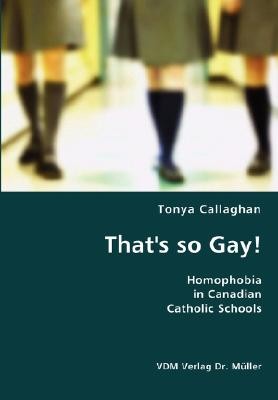
- We will send in 10–14 business days.
- Author: Tonya Callaghan
- Publisher: VDM Verlag Dr. Mueller E.K.
- Year: 2007
- Pages: 268
- ISBN-10: 3836424975
- ISBN-13: 9783836424974
- Format: 17 x 24.4 x 1.4 cm, softcover
- Language: English
- SAVE -10% with code: EXTRA
That's so Gay!- Homophobia in Canadian Catholic Schools (e-book) (used book) | bookbook.eu
Reviews
Description
Because Catholic doctrine about homosexuality is contradictory and fundamentally homophobic, some lesbian, gay, bisexual, transgender, or queer (LGBTQ) teachers find themselves having to deny their sexuality and resort to hiding in a metaphorical Catholic "closet" when teaching in Canadian Catholic schools. Educational researcher Tonya Callaghan employs a multi-method qualitative framework to uncover how homophobia is institutionalized in these schools. Callaghan first theorizes the problem and examines pertinent Catholic documents as well as key Canadian legal decisions. Then, using interviews with six LGBTQ teachers and her own experience as a lesbian teacher, Callaghan retells the teachers' stories in the form of life-narrative vignettes. This varied research design provides much needed insight into a previously untold aspect of Canadian schooling. It offers a valuable perspective that may be beneficial to LGBTQ teachers and their colleagues, school administrators, government officials, teachers' unions, and human rights activists. This book also may be of interest to researchers in the fields of education, sociology, law, ethics, sexuality studies, and religion.
EXTRA 10 % discount with code: EXTRA
The promotion ends in 20d.05:51:03
The discount code is valid when purchasing from 10 €. Discounts do not stack.
- Author: Tonya Callaghan
- Publisher: VDM Verlag Dr. Mueller E.K.
- Year: 2007
- Pages: 268
- ISBN-10: 3836424975
- ISBN-13: 9783836424974
- Format: 17 x 24.4 x 1.4 cm, softcover
- Language: English English
Because Catholic doctrine about homosexuality is contradictory and fundamentally homophobic, some lesbian, gay, bisexual, transgender, or queer (LGBTQ) teachers find themselves having to deny their sexuality and resort to hiding in a metaphorical Catholic "closet" when teaching in Canadian Catholic schools. Educational researcher Tonya Callaghan employs a multi-method qualitative framework to uncover how homophobia is institutionalized in these schools. Callaghan first theorizes the problem and examines pertinent Catholic documents as well as key Canadian legal decisions. Then, using interviews with six LGBTQ teachers and her own experience as a lesbian teacher, Callaghan retells the teachers' stories in the form of life-narrative vignettes. This varied research design provides much needed insight into a previously untold aspect of Canadian schooling. It offers a valuable perspective that may be beneficial to LGBTQ teachers and their colleagues, school administrators, government officials, teachers' unions, and human rights activists. This book also may be of interest to researchers in the fields of education, sociology, law, ethics, sexuality studies, and religion.


Reviews